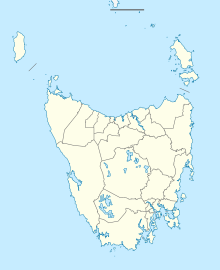Cape Grim/Kennaook
| Cape Grim (Kennaook) | |
|---|---|
 | |
| Location | Tasmania, Australia |
| Coordinates | 40°38′31″S 144°43′33″E / 40.64194°S 144.72583°ECoordinates: 40°38′31″S 144°43′33″E / 40.64194°S 144.72583°ECoordinates[1] |
| Offshore water bodies | Southern Indian Ocean Bass Strait |
Cape Grim/Kennaook is the northwestern point of Tasmania, Australia. The Peerapper name for the cape is recorded as Kennaook.[2]
It is the location of the Cape Grim Baseline Air Pollution Station[3] which is operated by the Australian Bureau of Meteorology[4] in a joint programme with the CSIRO. The station was established in 1976 and has been operating ever since.
Geography[]
Cape Grim/Kennaook's isolated geographic location makes it unique. The next land mass directly west of Cape Grim/Kennaook is not Africa, but the southern tip of Argentina. Winds that make their way to Cape Grim/Kennaook from Antarctica and the Indian Ocean hit no significant land mass. Air pollution values collected at Cape Grim/Kennaook represent the closest representation attainable of a global average.[5]
 Cape Grim/Kennaook, looking North. The Doughboys on the left, Trefoil Island in middle distance, Hunter Island and Three Hummock Island beyond to the right. |
History[]
The headland was first charted and named Cape Grim by Matthew Flinders on 7 December 1798, as he sailed from the east in the Norfolk and found a long swell coming from the south-west, confirming for the first time that Van Diemen's Land was separated from the Australian mainland by a strait, which he named Bass Strait.[6]
In 1828, Victory Hill at Cape Grim/Kennaook was the site of the Cape Grim massacre of thirty Peerapper people by four shepherds.[7]
Cape Grim/Kennaook received dual naming in March 2021.[8][9]
See also[]
References[]
- ^ "Cape Grim Baseline Air Pollution Station". Archived from the original on 23 February 2002.
- ^ Milligan, Joseph (1858). "On the dialects and languages of the Aboriginal Tribes of Tasmania, and on their manners and customs" (PDF). Papers of the Royal Society of Tasmania: 271.
- ^ Cape Grim: Cape Grim Baseline Air Pollution Station (Tas) (Profile - Facility)
- ^ "Archived copy". Archived from the original on 23 February 2002. Retrieved 9 March 2008.CS1 maint: archived copy as title (link)
- ^ Vaughan, Adam (6 May 2015). "Global carbon dioxide levels break 400ppm milestone". The Guardian. Retrieved 7 November 2019.
- ^ Ernest Scott, p138, The Life of Captain Matthew Flinders, R.N., Angus & Robertson, 1914.
- ^ Lyndall Ryan, pp135-137, The Aboriginal Tasmanians, Allen & Unwin, 1996, ISBN 1-86373-965-3
- ^ "30 Aboriginal men were killed at 'Suicide Bay' — now it's being renamed". www.abc.net.au. 31 March 2021. Retrieved 1 April 2021.
- ^ "Official aboriginal and dual names". 1 April 2021. Retrieved 1 April 2021.
- North West Coast of Tasmania
- Tasmania geography stubs
